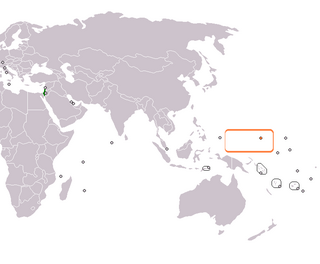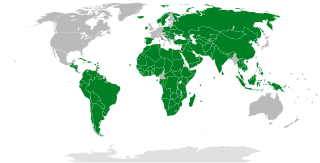Related Research Articles

The Palestine Liberation Organization is a Palestinian nationalist political and militant organization founded in 1964 with the initial purpose of establishing Arab unity and statehood over the territory of former Mandatory Palestine, in opposition to the State of Israel. In 1993, alongside the Oslo I Accord, the PLO's aspiration for Arab statehood was revised to be specifically for the Palestinian territories under an Israeli occupation since the 1967 Arab–Israeli War.

The United Nations General Assembly is one of the six principal organs of the United Nations (UN), serving as the main deliberative, policymaking, and representative organ of the UN. Currently in its 77th session, its powers, composition, functions, and procedures are set out in Chapter IV of the United Nations Charter. The UNGA is responsible for the UN budget, appointing the non-permanent members to the Security Council, appointing the UN secretary-general, receiving reports from other parts of the UN system, and making recommendations through resolutions. It also establishes numerous subsidiary organs to advance or assist in its broad mandate. The UNGA is the only UN organ where all member states have equal representation.

The member states of the United Nations comprise 193 sovereign states. The United Nations (UN) is the world's largest intergovernmental organization. All members have equal representation in the UN General Assembly.
A United Nations General Assembly resolution is a decision or declaration voted on by all member states of the United Nations in the General Assembly.

Palestine, officially the State of Palestine, is a state located in the Southern Levant region of Western Asia. Officially governed by the Palestine Liberation Organization (PLO), it claims the West Bank and the Gaza Strip as its territory, though the entirety of that territory has been under Israeli occupation since the 1967 Six-Day War. As a result of the Oslo Accords of 1993–1995, the West Bank is currently divided into 165 Palestinian enclaves that are under partial Palestinian National Authority (PNA) rule; the remainder, including 200 Israeli settlements, is under full Israeli control. The Gaza Strip has been ruled by the militant Islamic group Hamas and has been subject to a long-term blockade by Egypt and Israel since 2007.
United Nations General Assembly Resolution 3379, adopted on 10 November 1975 by a vote of 72 to 35, "determine[d] that Zionism is a form of racism and racial discrimination". It was revoked in 1991 with UN General Assembly Resolution 46/86. The vote on Resolution 3379 took place approximately one year after UNGA 3237 granted the PLO Permanent Observer status, following PLO president Yasser Arafat's "olive branch" speech to the General Assembly in November 1974. The resolution was passed with the support of the Soviet bloc, in addition to the Arab- and Muslim-majority countries, many African countries, and a few others.
China is one of the charter members of the United Nations and is one of five permanent members of its Security Council.
Issues relating to the State of Israel and aspects of the Arab–Israeli conflict and more recently the Iran-Israel conflict occupy repeated annual debate times, resolutions and resources at the United Nations. Since its founding in 1948, the United Nations Security Council, has adopted 79 resolutions directly related to the Arab–Israeli conflict as of January 2010.

The United Nations Human Rights Council (UNHRC) is a United Nations body whose mission is to promote and protect human rights around the world. The Council has 47 members elected for staggered three-year terms on a regional group basis. The headquarters of the Council are at the United Nations Office at Geneva in Switzerland.
United Nations General Assembly Resolution 3236, adopted by the 29th Session of the General Assembly on November 22, 1974 recognizes the Palestinian people's right to self-determination, officializes United Nations contact with the Palestine Liberation Organization and added the "Question of Palestine" to the U.N. Agenda.
The United Nations General Assembly has granted observer status to international organizations, entities, and non-member states, to enable them to participate in the work of the United Nations General Assembly, though with limitations. The General Assembly determines the privileges it will grant to each observer, beyond those laid down in a 1986 Conference on treaties between states and international organizations. Exceptionally, the European Union (EU) was in 2011 granted the right to speak in debates, to submit proposals and amendments, the right of reply, to raise points of order and to circulate documents, etc. As of May 2011, the EU is the only international organization to hold these enhanced rights, which has been likened to the rights of full membership, short of the right to vote.
The politics of the Palestinian National Authority (PNA) take place within the framework of a semi-presidential multi-party republic, with a legislative council, an executive president, and a prime minister leading the cabinet.
Issues relating to the State of Palestine and aspects of the Israeli–Palestinian conflict occupy continuous debates, resolutions, and resources at the United Nations. Since its founding in 1948, the United Nations Security Council, as of January 2010, has adopted 79 resolutions directly related to the Arab–Israeli conflict.

Israel – Micronesia relations are diplomatic and other relations between the State of Israel and the Federated States of Micronesia. Israel was among the first countries to establish formal diplomatic relations with Micronesia.
United Nations General Assembly resolution 67/19 is a resolution upgrading Palestine to non-member observer state status in the United Nations General Assembly. It was adopted by the sixty-seventh session of the United Nations General Assembly on 29 November 2012, the date of the International Day of Solidarity with the Palestinian People and the 65th anniversary of the adoption by the General Assembly of resolution 181(II) on the Future Government of Palestine. The draft resolution was proposed by Palestine's representative at the United Nations. It, however, maintains the status of the Palestinian Liberation Organization as the representative of the Palestinian people within the United Nations system. Though strongly contested by the United States and the government of Israel, former Israeli Prime Minister Ehud Olmert expressed support for the measure. The motion was seen as largely symbolic, though it could allow Palestine to start proceedings at the International Criminal Court against Israel. Its timing, following a year in which Palestine obtained membership of UNESCO and the UN Security Council was unable "to make a unanimous recommendation" on their application for full UN membership, and coming several days after the completion of Operation Pillar of Defense, was also noted. The new status equates Palestine with that of the Holy See within the United Nations system and implicitly recognises Palestinian sovereignty.
The Palestinian Declaration of Independence formally established the State of Palestine, and was written by Palestinian poet Mahmoud Darwish and proclaimed by Yasser Arafat on 15 November 1988 in Algiers, Algeria. It had previously been adopted by the Palestinian National Council (PNC), the legislative body of the Palestine Liberation Organization (PLO), by a vote of 253 in favour, 46 against, and 10 abstaining. It was read at the closing session of the 19th PNC to a standing ovation. Upon completing the reading of the declaration, Arafat, as Chairman of the PLO, assumed the title of "President of Palestine." In April 1989, the PLO Central Council elected Arafat as the first President of the State of Palestine.

International recognition of the State of Palestine has been the objective of the Palestine Liberation Organization (PLO) since the Palestinian Declaration of Independence formally established the de jure sovereign state on 15 November 1988 in Algiers, Algeria, at an extraordinary session in-exile of the Palestinian National Council. The declaration was promptly acknowledged by a range of countries, and by the end of the year, the proclaimed Palestinian state was recognized by over 78 countries. As of 1 June 2023, 139 of the 193 United Nations (UN) member states and two non-member states have recognized it. Palestine also has been a non-member observer state of the UN General Assembly since the passing of United Nations General Assembly resolution 67/19 in November 2012.

The 70th Session of the United Nations General Assembly opened on 15 September 2015. The President of the United Nations General Assembly was from the Western European and Others Group.
References
- ↑ "World Leaders Adopt Declaration Reaffirming Rule of Law as Foundation for Building Equitable State Relations, Just Societies". Archived from the original on 2013-12-31. Retrieved 2017-06-28.
- ↑ "General Assembly Faces Choice: Adapt or be Left Behind, Warns Body's President, Urging 'Bold Action' to Revitalize United Nations Most Representative Forum". Archived from the original on 2013-12-31. Retrieved 2017-06-28.
- ↑ "General Assembly Adopts Consensus Text Reaffirming Strong Support for Indispensable Role of International Atomic Energy Agency". Archived from the original on 2013-12-31. Retrieved 2017-06-28.
- ↑ "'Archaic, Punitive' Embargo Must be Consigned to History Books, Say Speakers, as General Assembly, for Twenty-First Year, Demands End to Cuba Blockade". Archived from the original on 2013-10-05. Retrieved 2017-06-28.
- 1 2 3 4 5 6 7 8 9 10 11 "General Assembly of the United Nations". www.un.org.
- ↑ "United Nations Official Document". www.un.org.
- ↑ "Pledging United Nations Continued Support to Government, People of Afghanistan, General Assembly Adopts Consensus Text Welcoming Phased Security Transition". Archived from the original on 2013-12-14. Retrieved 2017-06-28.
- 1 2 "Adopting Resolution, General Assembly Invites Stakeholders to Promote Principles of Updated United Nations Action Plan on Sport for Peace, Development". Archived from the original on 2013-12-31. Retrieved 2017-06-28.
- 1 2 "Will the Palestinian state get UN recognition despite Israeli opposition?". India Today.
- ↑ "United Nations Official Document". www.un.org. Archived from the original on 2012-12-01.
- ↑ "Who backs Palestine UN bid? Ehud Olmert, among others". Christian Science Monitor. 28 November 2012.
- ↑ "The Permanent Mission of Germany to the United Nations New York - Home". Archived from the original on 2012-11-27. Retrieved 2012-11-29.
- ↑ Bologna, Caroline. "HuffPost - Breaking News, U.S. and World News | HuffPost". Huffingtonpost.com. Retrieved 2019-10-15.
- 1 2 3 4 5 6 "Adopting Six Resolutions by Recorded Vote, General Assembly Concludes Annual Debates on Question of Palestine, Wider Middle East Situation". Archived from the original on 2014-03-10. Retrieved 2017-06-28.
- 1 2 3 4 5 6 7 "General Assembly, in Wake of High-Stakes Debate in First Committee that Championed Common Positions but Fell Short of Bridging Divides, Adopts 58 Texts". Archived from the original on 2014-05-19. Retrieved 2017-06-28.
- ↑ "UN committee approves first-ever text calling for end to female genital mutilation". un.org. 28 November 2012.
